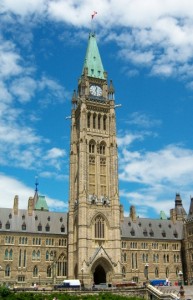We and our children are all citizens of at least one country of the world. As Christians we are also citizens of heaven. Our dual citizenship leads to a number of questions:
- How do these two citizenships relate?
- What is our country’s history, and how do its laws work?
- What does the Bible say about government?
- What should we do for our countries?
- What should we expect from our governments?
- What are our responsibilities?
These are all things we need to discuss with our children and teens. While there are many aspects to teaching our children to be good citizens of both the earthly and heavenly kingdoms, teaching about earthly citizenship involves three key elements: example, celebration, and quality resources.
Example
Usually our citizenship activities are low-key: praying, voting, and being involved in defense of important rights and freedoms, such as the right to life for all. Our children are involved, and they see what citizenship means.
For example, next week we will again part of Canada’s national March for Life with thousands of others.
I just received word from Kregel Publishing that Kim Ketola likes my idea of partnering with We Need a Law to spread the word about the emotional devastation of abortion and God’s great mercy and forgiveness using her book Cradle My Heart (read my review here). We’re all quite excited about the potential positive impact and our part in it.
Other people will, of course, serve differently as they find their own path in life. For example, during elections, Mr. 18 is my go-to source for information on all aspects of every candidate. Others may contribute to energy policy, serve in their local community, or do something else that matches their skills and opportunities.
Celebrations
While serving is a wonderful thing to do, the highlights of citizenship seem to involve celebrations.
As a Canadian born in the Netherlands, I have strong ties to two countries and we enjoy the celebrations of both.
Last year we celebrated Queen Elizabeth’s Jubilee on Parliament Hill, listening to a carillon concert (and watching Justin Trudeau greet a group of teens). Later we enjoyed the famed RCMP musical ride and watched Canada Day fireworks.
Just yesterday, we flew a Dutch flag, ate orange cupcakes, and focused on the Dutch royal family as Willem-Alexander and Maxima became king and queen of the Netherlands.
Often we attend Remembrance Day services, and we go out of our way to learn about the bravery of the Canadian soldiers who freed our Dutch ancestors.
Resources
While showing what citizenship is and celebrating national events are both important, we also need resources to help us think about the questions listed above. Resources for understanding citizenship and government from a Christian point of view are not always easy to find.
Here are some good ones:
- God and Government by C. Van Dam: This book addresses issues such as the duties of governments and citizens “through the eyes of Scripture and against the backdrop of North America’s dual heritage of Christianity and humanism.” Each chapter concludes with an extensive booklist, making God and Government a possible basis for an intense high school course as well as an enlightening resource for adults.
- Christian Citizenship Guide by Michael Wagner: A concise guide to Christianity and Canadian political life that discusses history, the human rights movement, and what you can do.
- Northwoods Press: The main source of Canadian history and geography resources for homeschoolers.
- The Omnibus curriculum from Veritas Press: Political thought and practice through the centuries are studied from a robust Christian point of view. Very illuminating.
May our Heavenly King be glorified as we understand more and more how citizenship in our earthly countries is influenced by our heavenly citizenship. May we be able to communicate that vision to our children.
Disclosure: As always, I am not compensated for recommending resources.
This post is linked to Encourage One Another Wednesday, Raising Homemakers, and Trivium Tuesdays.


Great topic! Thanks for getting us thinking at Trivium Tuesdays!
You’re welcome, Amy! Thinking is what classical education is all about. 😉
[…] Tea Time With Annie Kate posts on: Learning about Earthly Citizenship in the Light of our Heavenly Citizenship. […]